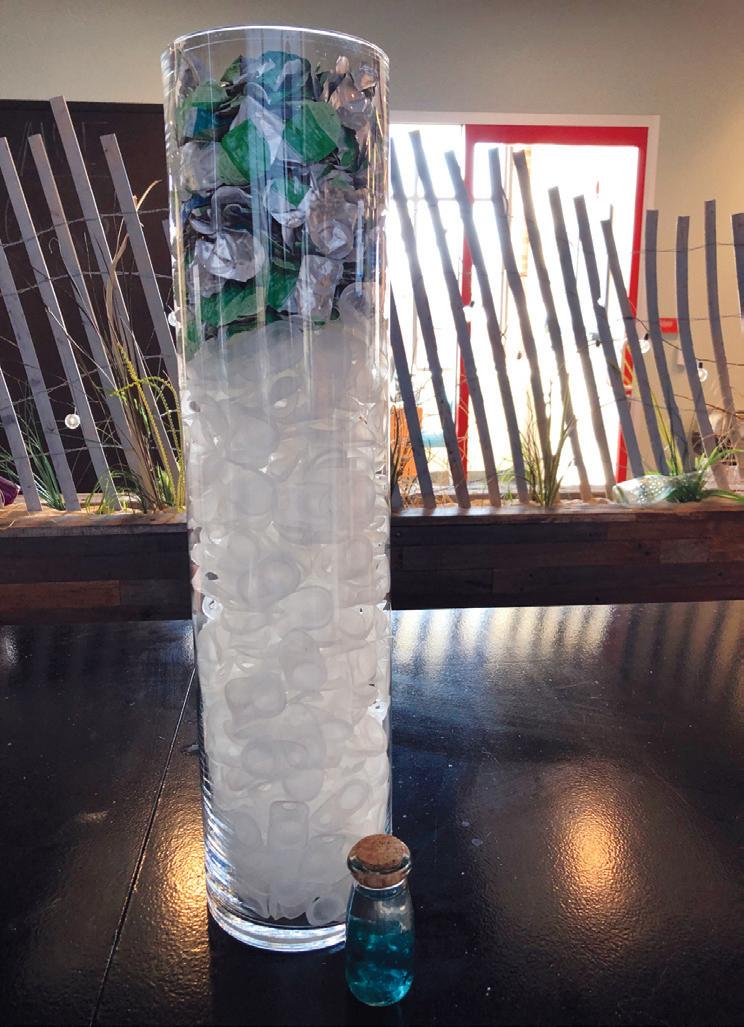
5 minute read
Celebrate The Earth
13 Austin South Asian | July 2021 Celebrate The Earth With A New Vision On Eye Care
When it comes to recycling, you may not often think about something as small as your contact lenses. Did you know, though, that 45 million Americans who wear contact lenses flush anywhere between 1.8 and 3.36 billion lenses down the toilet or sink per year? As a result, contact lenses could be contributing to the trillions of microplastics in waterways that can harm marine wildlife and even enter our food supply.
If you’re like many people, you’ve probably already made a few changes to your routine, from switching to reusable water bottles and reusable grocery bags, even to composting. There are everyday sustainable solutions for so many parts of our lives – did you know there’s even one to recycle our contact lenses and to help reduce microplastic exposure in our environment? Here’s what to know:
Because of their small size, contact lenses can get filtered out of regular recycling center facilities and end up in landfills. Understanding the impact this could have on the environment, Bausch + Lomb, the makers of Biotrue ONEday daily disposable contact lenses joined forces with TerraCycle, a global leader in recycling hard-torecycle waste, to develop the first and only contact lens recycling program available in the U.S., the ONE-by-ONE Recycling Program. The program collects contact lens waste, which is then separated based on composition and melted into plastic that can be combined with other recycled materials to become playground sets and park benches. Most recently Bausch + Lomb took the program one step further by repurposing the recycled waste to create custom training modules that were donated to the Guide Dog Foundation, a national notfor-profit that trains guide dogs for people who are blind or visually impaired. The modules, which were funded by the Bausch Foundation, included benches, tables, waste stations and an agility ramp used to train the dogs and to further enhance the organization’s Smithtown, N.Y. campus for those who visit. Launched in 2016, this first-of-its-kind recycling initiative has already collected and recycled nearly 30 million contact lenses, blister packs and top foils and processed about 180,000 pounds -- the equivalent weight of six school buses.
This free recycling program accepts used contact lens materials from Biotrue ONEday, as well as other brands. To participate, simply collect your used contact lenses, plus the blisters and foil they come in, and bring them to a participating eye care provider. There are over 5,600 eye care providers enrolled in the program nationwide. To find one near you, visit www. bauschrecycles.com.
While this change may seem small, it has the power to make a big impact on global recycling efforts, making it an excellent to start adopting today. (StatePoint)
Preventing The Spread Of COVID-19 In America’s Classrooms
While the rollout of the vaccine has been a relief for the nation’s teachers, many of whom have been working in-person on and off since the start of the pandemic, the reality is that not everyone will get the vaccine.
What’s more, being in the school building all day with children who are not yet approved for immunization leaves many educators and school staff vulnerable to COVID-19, no matter how many precautions they take while off the clock.
But there’s good news: new scientific breakthroughs are helping make schools safer by protecting surfaces for far longer than routine cleaning, which does so only momentarily.
The Problem
Human coronaviruses can persist on inanimate surfaces such as plastic, glass, fibers and metals for up to nine days, according to the National Institutes of Health.
While routine cleaning and disinfection help, they leave surfaces immediately vulnerable to recontamination, particularly in highly trafficked areas like break rooms, desks, lockers, and especially school and classroom entrances. Traditional disinfectants alone can’t guarantee full coverage, protect for long periods, or even preIn keeping America’s teachers safe, standard cleaning methods alone can only do so much.
A new EPA-approved product, of global infection caused by the transmission of microorganisms encountered in daily life.
vent recontamination.
On top of that, the burden of constantly reapplying momentary disinfectants throughout the day has largely fallen on teachers, many of whom are paying for cleaning supplies out of their own paychecks. however, when used as directed, offers continuous protection from COVID-19 with a single application, making school safety more reliable and efficient.
The product, SurfaceWise2, was developed by biotechnology company Allied BioScience, which has a mission of reducing the footprint “The pandemic has put more responsibilities on schools than ever before, and our teachers are stretched thin,” says Jess Hilton, chief marketing officer, Allied BioScience.
“Providing additional safety measures for this sometimes overlooked frontline worker group is critical.”
As leading infectious disease expert Dr. Charles P. Gerba explains, schools have always been a major germ transfer zone, and the pandemic has only elevated this health and safety risk.
“The average child touches their face about 40 to 50 times per hour,” says Dr. Gerba. “Having a reliable way to protect surfaces for long periods of time is essential.” Independent lab studies conducted by Dr. Gerba found SurfaceWise2 to be effective against Human Coronavirus 229E, the EPA-approved surrogate, demonstrating the ability to successfully protect against COVID-19.

Coated surfaces were found to reduce the concentration of these viruses by greater than 99.9% within two hours of contact.
SurfaceWise2 has undergone rigorous reviews and extensive safety testing, carrying the lowest possible EPA toxicity rating making it safe to use in enclosed spaces, which is critical as teachers must work inside the classroom.
The coating is non-toxic, non-irritating, and contains no chemicals that produce harmful vapors or gases. To learn more, visit www. surfacewise.com.
“Alongside precautions like maskwearing and social distancing, effective long-term coatings to protect surfaces can allow schools to better keep their teachers safe, and help make the choice between safety and livelihood a little easier for America’s educators,” says Hilton.(StatePoint)










